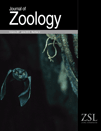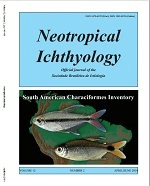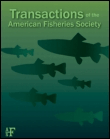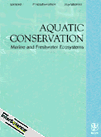
ENVIRONMENTAL BIOLOGY OF FISHES
Scope & Guideline
Illuminating the vital connections between fish and their habitats.
Introduction
Aims and Scopes
- Conservation Biology:
Research focusing on the conservation needs and management strategies for various fish species, particularly those that are endangered or threatened, highlighting urgent conservation measures. - Population Dynamics:
Studies on the population structure, growth, and recruitment of fish species, employing statistical models and field surveys to understand population trends and dynamics. - Trophic Ecology:
Exploration of the dietary habits and feeding relationships among fish species, often utilizing stable isotope analysis and gut content examination to assess food web structures. - Environmental DNA (eDNA) Studies:
Utilization of eDNA metabarcoding techniques for assessing biodiversity, distribution patterns, and the presence of fish species in various aquatic environments. - Fish Behavior and Physiology:
Investigation into the behavioral responses of fish to environmental changes, including the effects of temperature, salinity, and habitat structure on fish physiology and behavior. - Ecological Interactions:
Examination of the interactions between fish and their environments, including predator-prey dynamics, habitat utilization, and the influence of anthropogenic factors on fish communities.
Trending and Emerging
- Climate Change Impact Studies:
An increasing number of studies are focusing on how climate change affects fish behavior, migration patterns, and reproductive strategies, reflecting a growing concern for the impacts of global warming on aquatic ecosystems. - Use of Advanced Molecular Techniques:
There is a notable rise in the application of molecular techniques, including genomics and eDNA analysis, to study fish populations and their interactions with the environment, facilitating more precise assessments of biodiversity. - Community Ecology and Habitat Dynamics:
Emerging themes include investigations into community structure and habitat dynamics, particularly how environmental changes and human activities affect fish assemblages in various ecosystems. - Social and Economic Implications of Fisheries:
Research increasingly addresses the socio-economic aspects of fisheries management, examining the interplay between fish populations, human activities, and conservation efforts. - Behavioral Ecology:
There is a trend towards exploring the behavioral ecology of fish, particularly in relation to environmental stressors and anthropogenic impacts, to inform conservation strategies.
Declining or Waning
- Invasive Species Studies:
While research on invasive fish species was once a prominent theme, recent publications have shifted focus towards conservation and management of native species, leading to a decline in studies centered solely on invasive species. - Historical Ecology:
Research focusing on historical baselines and long-term ecological changes in fish populations has become less frequent, possibly due to a greater emphasis on current conservation challenges and immediate ecological responses. - Traditional Taxonomy:
While taxonomy remains important, there has been a noticeable reduction in papers dedicated to traditional taxonomic revisions, as more emphasis is placed on integrative approaches combining genetic, ecological, and behavioral data.
Similar Journals

JOURNAL OF ZOOLOGY
Bridging foundational research with innovative zoological studies.JOURNAL OF ZOOLOGY, published by Wiley, stands as a premier scholarly journal in the fields of Animal Science and Zoology, renowned for its outstanding contributions to the knowledge of animal biology and ecology. With an impressive impact factor and a strong ranking in the Q1 category for Animal Science and Zoology, as well as Q2 for Ecology, Evolution, Behavior, and Systematics, the journal rigorously engages with both foundational research and groundbreaking discoveries since its inception in 1830. Located in Hoboken, New Jersey, this journal is dedicated to fostering the academic community's understanding of zoological sciences, providing access to important research that shapes wildlife conservation efforts and ecological studies. Although the journal does not currently offer open access options, it continues to attract significant attention, as evidenced by its strong Scopus rankings in related categories. Researchers, professionals, and students will find invaluable resources in the JOURNAL OF ZOOLOGY to advance their understanding of animal life and the ecological challenges it faces today.

Journal of Ecohydraulics
Exploring the synergy of water science and environmental management.The Journal of Ecohydraulics, published by Taylor & Francis Ltd, stands as a premier platform for interdisciplinary research, merging the disciplines of civil engineering, water science, and environmental management. With an ISSN of 2470-5357 and an E-ISSN of 2470-5365, this esteemed journal, based in the United Kingdom, has been recognized within the top quartile (Q1) in both Civil and Structural Engineering and Water Science and Technology categories. Its impactful research, reflected in its notable Scopus rankings—#40 out of 261 in Environmental Science and #69 out of 379 in Engineering—underscores its vital role in advancing knowledge and addressing the critical challenges posed by the interaction of ecological and hydraulic systems. The journal invites contributions that explore innovative methodologies and sustainable practices relevant to ecohydraulics, fostering a robust dialogue among researchers, professionals, and students interested in the sustainable management of aquatic and terrestrial environments.

Neotropical Ichthyology
Fostering collaboration for the conservation of Neotropical fish.Neotropical Ichthyology is a prestigious open-access journal published by the SOC BRASILEIRA ICTIOLOGIA, dedicated to advancing the field of ichthyology within the Neotropical region. Since its inception in 2003, the journal has provided a vital platform for researchers, professionals, and students to disseminate significant findings related to fish biology, ecology, and conservation. With an impact factor that is reflected in its impressive Q1 ranking in Animal Science and Zoology and Q2 rankings in both Aquatic Science and Ecology, Evolution, Behavior and Systematics, it stands as a leading resource for cutting-edge research. Located in Brazil, at the UNIV SAO PAULO, the journal not only contributes to scientific knowledge but also fosters collaboration among ichthyologists dedicated to the rich aquatic biodiversity of the Neotropical region, ensuring that critical insights into fish species, habitats, and conservation strategies are accessible to a global audience.

TRANSACTIONS OF THE AMERICAN FISHERIES SOCIETY
Illuminating the path for fisheries innovation and sustainability.TRANSACTIONS OF THE AMERICAN FISHERIES SOCIETY, published by Wiley, is a leading journal dedicated to the field of fisheries science and aquatic ecology, with a rich history dating back to its inception in 1872. As an esteemed publication within the realms of Aquatic Science and Ecology, Evolution, Behavior, and Systematics, it currently holds a Q2 quartile ranking, demonstrating its significance and influence in these disciplines. The journal is not open access, which enables a curated peer-review process while ensuring high-quality research dissemination. The journal serves as a vital platform for scholars and practitioners alike, providing essential insights into the management and conservation of aquatic resources. Its commitment to addressing contemporary challenges faced in fisheries and aquatic environments makes it indispensable for researchers, professionals, and students seeking to contribute to this dynamic field.

Aquatic Biology
Exploring the Depths of Aquatic ScienceAquatic Biology, published by INTER-RESEARCH, is a leading open-access journal dedicated to the scientific exploration of aquatic ecosystems, promoting innovative research in the fields of aquatic science, ecology, and oceanography since its inception in 2007. With an E-ISSN of 1864-7782, the journal publishes original articles, reviews, and data papers that contribute to the understanding of aquatic biology in its myriad forms. As of 2023, it holds a respectable Q3 ranking across multiple categories including Aquatic Science and Ecology, reflecting its sustained impact within the scientific community. Situated in Germany, Aquatic Biology operates a policy of open access since 2014, ensuring that valuable research findings are readily available to researchers, professionals, and students worldwide, thus fostering collaboration and knowledge dissemination. By addressing diverse aquatic topics, the journal plays a crucial role in advancing the study and conservation of marine and freshwater environments, making it an essential resource for anyone seeking to deepen their understanding of aquatic systems.

Journal of Fish and Wildlife Management
Uncovering sustainable practices for ecological health.The Journal of Fish and Wildlife Management, published by the U.S. Fish & Wildlife Service, serves as a vital resource for scholars, researchers, and professionals in the fields of Animal Science, Ecology, and Conservation Biology. With its ISSN 1944-687X, this esteemed journal has been disseminating critical research findings since 2010, contributing significantly to the understanding of fish and wildlife conservation practices and their ecological impacts. Despite its Q3 category rankings in various disciplines as of 2023, it provides a platform for innovative research that influences policy and management strategies for biodiversity conservation. The journal, although not open access, remains committed to advancing the scientific discourse surrounding wildlife management with articles that emphasize practical conservation efforts and ecological sustainability. Readers can expect a diverse range of articles that promote best practices in the management and conservation of fish and wildlife resources, furthering our collective mission of preserving ecological health and biodiversity for future generations.

AQUATIC CONSERVATION-MARINE AND FRESHWATER ECOSYSTEMS
Empowering conservation through innovative research.AQUATIC CONSERVATION-MARINE AND FRESHWATER ECOSYSTEMS, published by WILEY, is a premier international journal dedicated to advancing the understanding of aquatic ecosystems and their conservation. With an impact factor reflecting its significant influence and a distinguished position in the Q1 quartile across key categories such as Aquatic Science, Ecology, and Nature and Landscape Conservation, this journal serves as an essential resource for researchers and professionals engaged in the study and protection of marine and freshwater environments. Covering a broad array of topics, from ecosystem management to conservation strategies, the journal encourages the dissemination of innovative research and interdisciplinary perspectives. Although it is not an open-access publication, this journal is esteemed for its rigorous peer-review process, facilitating a platform where vital research influences policy and practice in the aquatic sciences. Established in 1991, AQUATIC CONSERVATION continues to be a cornerstone in the academic exploration and safeguarding of aquatic ecosystems through to its converged years of 2024 and beyond, providing a critical lens for the future of environmental sustainability.

MARINE AND FRESHWATER RESEARCH
Exploring the depths of aquatic ecosystems.Marine and Freshwater Research is a prestigious journal published by CSIRO PUBLISHING that serves as a key platform for the dissemination of cutting-edge research in the fields of Aquatic Science, Ecology, and Oceanography. With an impactful presence since its inception in 1948, the journal provides critical insights into the dynamics of freshwater and marine ecosystems, promoting interdisciplinary approaches that contribute to our understanding of biodiversity and sustainability. Currently ranked in the Q2 category across major scientific domains, including Ecology and Aquatic Science, it enjoys a robust academic reputation supported by impressive Scopus rankings, such as Rank #66/247 in Aquatic Science and Rank #44/145 in Oceanography, reflecting its high citation impact and relevance. While offering a subscription-based access model, the journal remains dedicated to fostering dialogue and innovation within the scientific community, aiming to bridge the gap between research findings and practical applications in environmental management. Located in Australia, Marine and Freshwater Research is an essential resource for researchers, professionals, and students dedicated to exploring the complexities of aquatic ecosystems and advocating for their preservation.

ACTA ICHTHYOLOGICA ET PISCATORIA
Empowering researchers in ichthyology and fisheries science.ACTA ICHTHYOLOGICA ET PISCATORIA is a distinguished peer-reviewed journal dedicated to the field of ichthyology and fisheries science, published by PENSOFT PUBLISHERS since its establishment as an open-access publication in 1970. Based in Poland, this journal serves as an essential platform for researchers, professionals, and students aiming to contribute to the scientific understanding of aquatic life. With an impressive H-index reflecting its growing influence, ACTA ICHTHYOLOGICA ET PISCATORIA is currently ranked in the Q3 quartile within both the Animal Science and Zoology and Aquatic Science categories. According to Scopus, it holds a rank of #227 in Animal Science and Zoology and #147 in Aquatic Science, demonstrating its relevance and contribution to these fields. The journal’s commitment to open access ensures that research findings are widely disseminated, fostering collaboration and knowledge sharing among the scientific community. With a historical scope extending from 1996 to 2024, ACTA ICHTHYOLOGICA ET PISCATORIA remains a vital resource for advancing aquatic research and fostering new insights into the complexities of fish biology and fisheries management.

ACTA ZOOLOGICA BULGARICA
Innovative Insights into Animal Science and EcologyACTA ZOOLOGICA BULGARICA is a prominent academic journal dedicated to advancing knowledge in the fields of Animal Science, Zoology, Aquatic Science, Ecology, Evolution, Behavior, and Systematics. Published by the Institute of Zoology, Bulgarian Academy of Sciences, this journal serves as an invaluable platform for researchers, professionals, and students to disseminate their findings and engage with contemporary issues in biodiversity and ecology. With an established history since its convergence in 2010 and an ongoing publication schedule through to 2024, the journal holds a Q4 category ranking in multiple disciplines, highlighting its role in fostering scholarly communication in these areas despite its recent entry into Scopus-indexed rankings. Although currently not an open-access journal, ACTA ZOOLOGICA BULGARICA remains a key resource for those interested in the latest research and developments, particularly within the ecological and zoological landscapes of Europe and beyond.